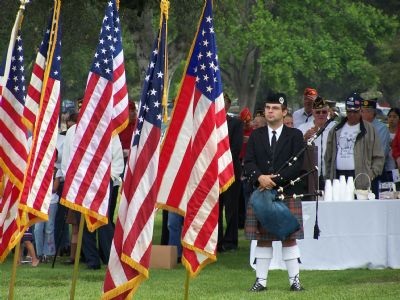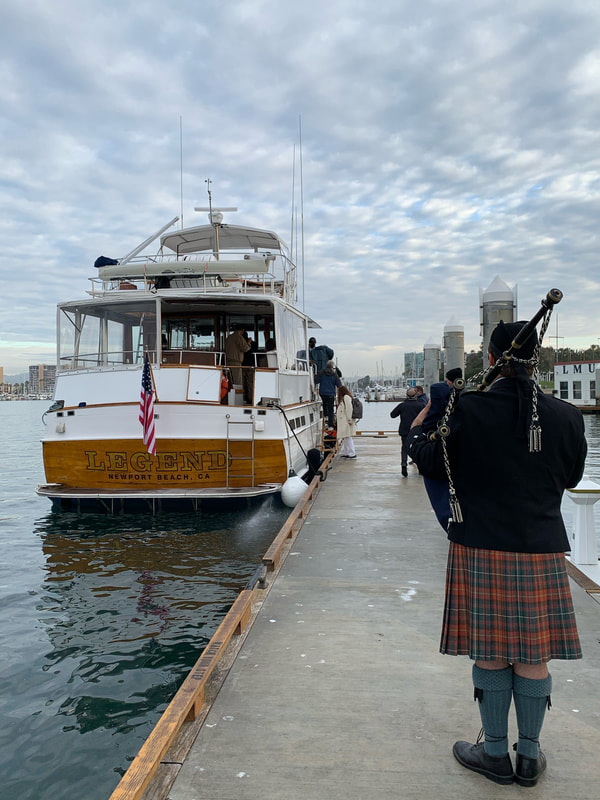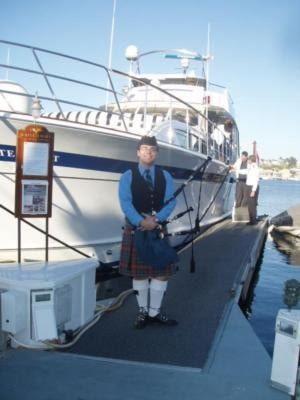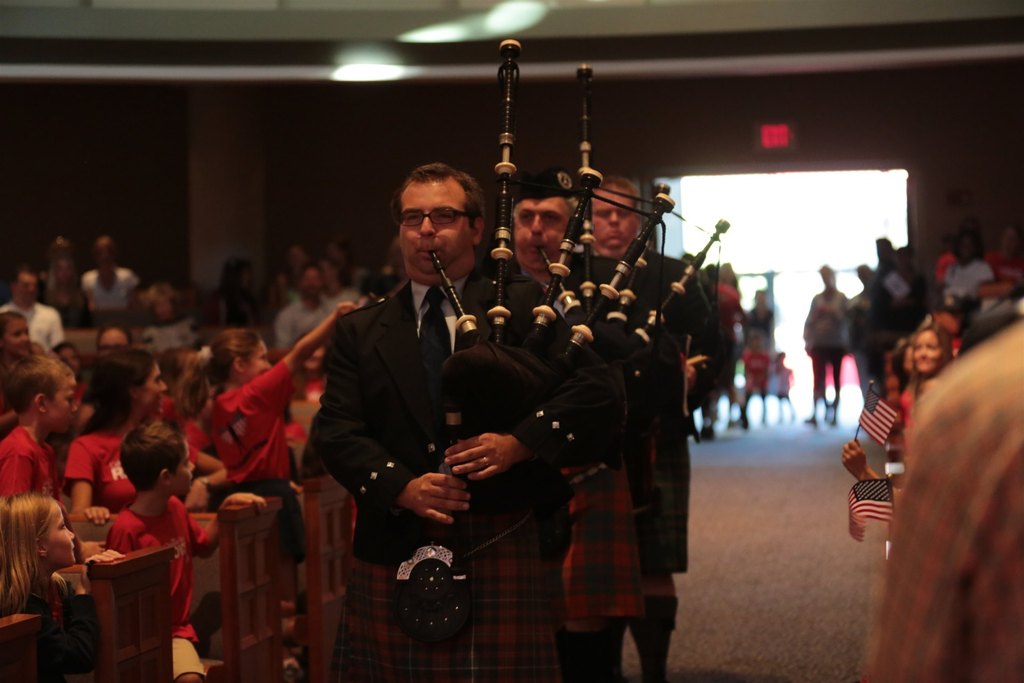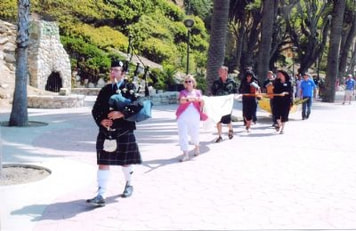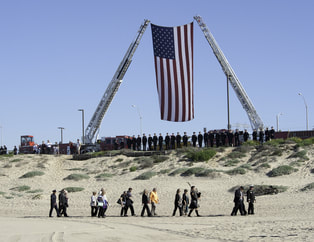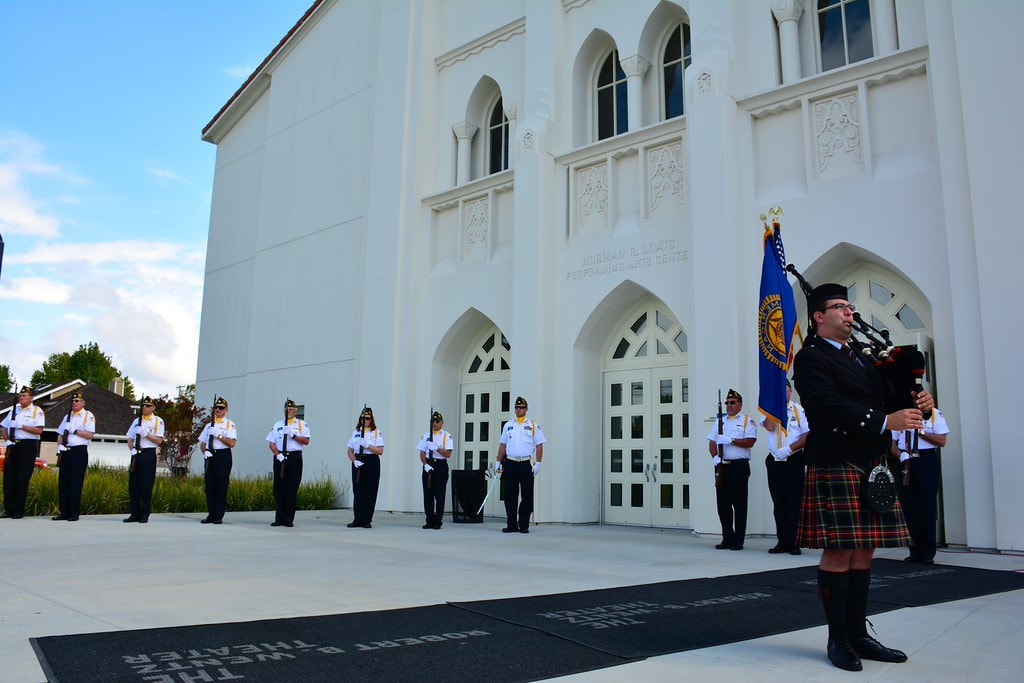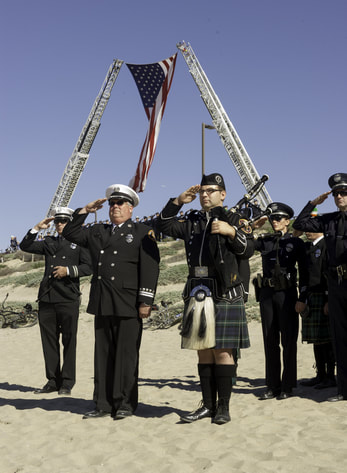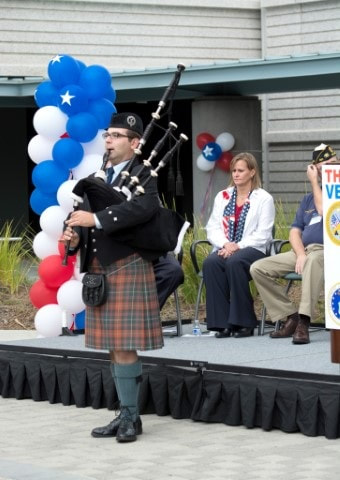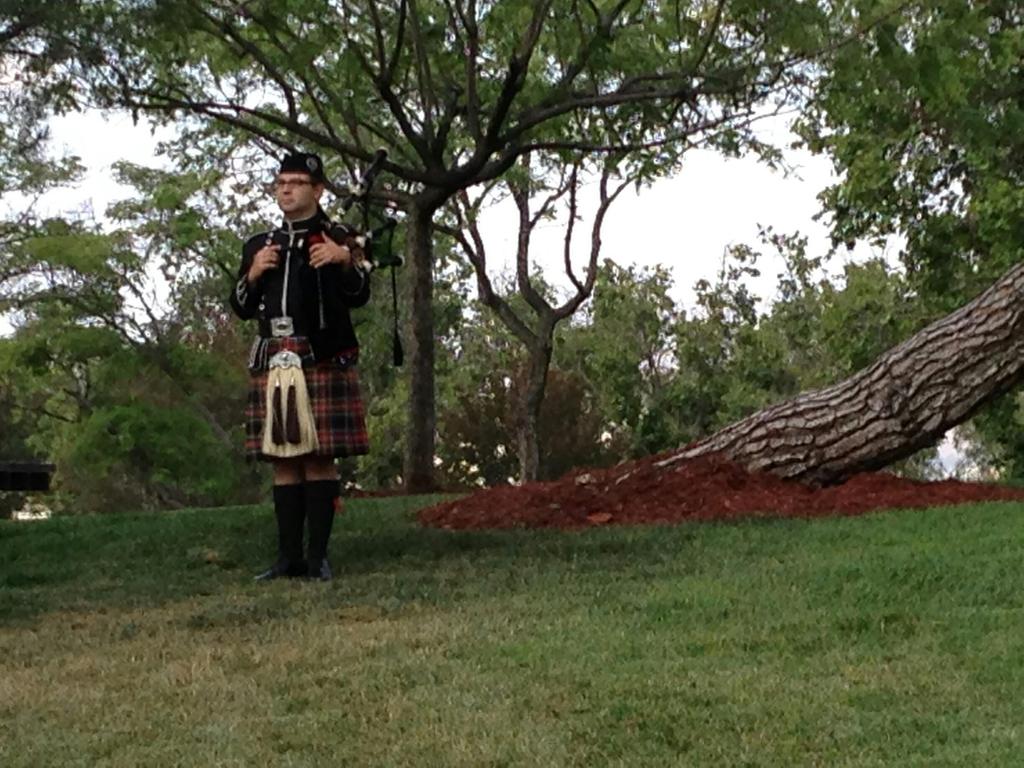Funerals & Memorials
Funerals and Memorial Services are special occasions for the remembrances of a loved one and the celebration of their life. Pipes and drums can add greatly to the emotional needs and ceremonial requirements of these kinds of services. Equipped with the right selection of tunes, a piper can assist in easing the pain and sorrow felt with the loss of a loved one. The popular gospel air, "Amazing Grace", for example, will undoubtedly evoke loving memories. It has been a cultural tradition for many centuries, particularly in Scotland and Ireland, to have a bagpiper play laments in honor of the departed. This tradition is continued here today in North America among Scots and Irish immigrants and their descendants, and has also become somewhat a tradition for honoring the dedication of duty of all persons of public service, particularly members and former members of the military, fire and police services.
I differ from other vendors in that I want to create a truly custom experience in honor of your loved one. Included in all memorial packages is a private meeting with me in person to review all of the details of your event such as dress options and tune assortment. If an in person meeting is not feasible, consultations can be held over the phone or utilizing online forums such as Skype or Zoom. For musical selection I will provide tunes for you to listen to and select from. I am also more than happy to discuss special requests. I do not have a predetermined limit in regards to the quantity of tunes I can play at the service.
I have been playing memorial services since 2000 and am therefore able to offer tips and suggestions where needed to ensure the functionality of your event. I also have a network of other professional pipers and drummers and so am able to offer options in addition to a single bagpiper. Popular alternatives include a trio with a piper and two drummers or a small band, but I would love to discuss what you have in mind. On the day of the event, I will arrive punctually, well dressed, and prepared. My instrument, as well as the instruments of any other pipers or drummers, will be tuned to competition standards and all musical arrangements, cues, and timing will be reviewed with the event planner or officiant. I take my performances seriously and will only accept the best.
I differ from other vendors in that I want to create a truly custom experience in honor of your loved one. Included in all memorial packages is a private meeting with me in person to review all of the details of your event such as dress options and tune assortment. If an in person meeting is not feasible, consultations can be held over the phone or utilizing online forums such as Skype or Zoom. For musical selection I will provide tunes for you to listen to and select from. I am also more than happy to discuss special requests. I do not have a predetermined limit in regards to the quantity of tunes I can play at the service.
I have been playing memorial services since 2000 and am therefore able to offer tips and suggestions where needed to ensure the functionality of your event. I also have a network of other professional pipers and drummers and so am able to offer options in addition to a single bagpiper. Popular alternatives include a trio with a piper and two drummers or a small band, but I would love to discuss what you have in mind. On the day of the event, I will arrive punctually, well dressed, and prepared. My instrument, as well as the instruments of any other pipers or drummers, will be tuned to competition standards and all musical arrangements, cues, and timing will be reviewed with the event planner or officiant. I take my performances seriously and will only accept the best.
About Funeral and Memorial Services
|
When Should the Piper Play?
I'm typically asked for one or more from the following list:
|
|
Before the Service Begins - The structure of most indoor funerals and memorial ceremonies are very similar to outdoor graveside/memorial services. A bagpiper can be used very effectively to greet the mourners arrive to create an air of solemnity and reflection, particularly if mourners are expected to arrive within a fairly short period of time (for instance, 15-20 minutes before a service begins). The amount of time that the piper plays before a service usually depends on whether the service takes place inside a building, or outside such as the grave-site, a private, home, beach, etc. The piper will generally play for a longer period (usually for 15-20 minutes) before the start of a service at a cemetery chapel or mausoleum. At a grave-site service (which often follows a church or chapel service), the playing time before the service begins is much shorter because the guests generally arrive together.
|
|
The Processional - Unless the casket or urn is placed prior to the service, the piper will play a processional tune as the pall-bearers take the casket from the hearse. The piper will then lead-off the procession, playing to the grave-site or inside the building. In a church setting, the piper may pipe to the front door of the church. After the initial blessing, the piper will again proceed playing, and lead the the pall-bearers and casket up the aisle to the alter.
Processional Music
|
|
During the Service - Bagpipe music can be used throughout the service as the family desires. I am sometimes requested to play a special selection at an appropriate time during the service. I have played a number of times ensemble with a church's pipe-organ, and/or as a prelude to a choral; this combination is quite outstanding in effect. Often there are military honors, flag folding, dove release, the placing of flowers, lowering of the casket, or other special presentations made during the ceremony. It is appropriate to play a tune either during or after these presentations, depending on etiquette for the specific presentation.
Ceremony Music
Hymns & Airs
Hymns and traditional slow airs are the most versatile tunes in the repertoire and may be played at any part of the ceremony. For the most impact, I recommend performing a hymn or air immediately after the "closing prayer" and concluding with an additional recessional tune. Many parts of a service may be devoid of music. I am often requested to to perform before or after eulogies or during communion.
Piobaireachd: Laments & Salutes
As an alternative to a hymn or air, it is also appropriate to have a performance of one of the great laments or salutes. This unique type of music is the classical music of the Highland Bagpipes and is called Piobaireachd ("pipe music", pronounced peeb-rock). Many of the pieces date from the 17th or 18th centuries during the baroque period.
Service Conclusion, Recessional, and After the Service - After the final prayers or remarks have been made, it is most fitting to perform a hymn, air, or one of the great laments. After this tune, a recessional tune may be played as an exiting tune. It is then customary to march out of the venue (or away from it in an outdoor setting, fading into the distance). If the remains are present for a traditional indoor funeral, the piper can again lead the pall-bearers and remains back down the aisle and out the door of the venue to the waiting hearse, and continue playing as guests mingle and depart. If a reception follows the service in a nearby hall, the piper can stand outside near the entrance and play as everyone proceeds to it.
|
|
Recessional Music
|
|
Funeral Procession - It can be a fitting touch to have the pipes, especially when accompanied by drums, to lead the funeral procession to the grave site from an on-site chapel. The procession from the hearse to the grave site is an opportune time to have the pipes and drums play a slow march or funeral march.
|
Testimonials
Darrell was fabulous, he played the songs I requested, perfectly. His rendition of Amazing Grace was awesome. As he played, he slowly walked away from us at the cemetery, at the same time as my mothers body was slowly being driven away to her final resting place. He timed it perfectly, we were all in tears and at the same time we felt a sense of closure as he walked away, the sound trailing as he goes. I highly recommend Darrell Calvillo, he truly made a heartbreaking day much more bearable, I am forever grateful." Charlene C.
"Darrell not only played beautifully for the funeral, but deported himself with the utmost professionalism, and respect. We had many comments about how beautiful and moving his music was. We would recommend him wholeheartedly, and if we ever needed a bagpiper again, he would be our first call." Elizabeth P.
"I was very happy with my choice to select Darrell to perform at my Scottish grandmother's funeral. We know the traditions, and he was spot on with his performance, both musically and ritually. He was very helpful in filling-in where there were gaps in our organization at the gravesite, and I wouldn't hesitate again to hire him or to recommend him to others." Robert M.
"Darrell came on time and offered more help than we expected. He understood that this was a very stressful time for me and my family and did exactly what was expected without much direction. At the end of the song we asked him to play he slowly walked away while still playing which gave a nice fade effect to the music. I highly recommend him for any gathering." Hannah H.
A true Professional. Arrived on time, performed flawlessly for our firefighter funeral. I would highly recommend Darrell for your next event. Plus he is a really nice guy." Marty B.
"We hired Darrell to play at the funeral of our police officer. Darrell was awesome and very professional. I loved the music arrangement he played. I highly recommend Darrell for any occasion!!" Janet O.
"Unfortunately there comes a time to plan for your parents funeral and I could not ask for anything more than to have Darrell Calvillo help in the time of need. He is like a trustworthy friend who you can depend to be there with the utmost professionalism and compassion. His musical skill has created wonderful memories for myself and family/friends and for that I am so grateful." Doug B
"Darrell really made our memorial service very special. We talked several times before the event, he helped with music selection and just made the whole process very easy. Thank you!" Bill C
"Darrell was amazing! He was smartly dressed, arrived well in advance, and played beautifully. He brought a special touch to the service. He was perfectly in tune and made good suggestions. His rendition of Amazing Grace was memorable for all the right reasons, it was incredible. We would not hesitate to book Darrell Calvillo again for any type of event! Donna R.
"Darrell was the epitome of professionalism. From the moment we spoke about my needs for our graveside service to his attire and beautiful bagpipe playing he was exactly what my father would've liked to hear. Thank you so for listening to our requests and playing just the right songs at the right time!
If you are looking for a piper for your event please contact Darrell, he will not disappoint you!" Gail P.
My stepdad had few requests for his memorial service, and having the bagpipes played was one of them. Darrell came and played before and after mass, and it was truly incredible and my mom was very happy - she wishes she could give him 10 stars because he was so great. Everyone was very impressed with his playing and crowded around to listen to him. He made the service even better by being there and playing for all of us. When we submitted our requests for quotes, he quickly responded and added a personal touch by calling to speak with us, which is something my stepdad always respected. If you need someone to play the bagpipes for any occasion, he would be your best choice.
Thank you Darrell!" Teresa F.
"Darrell not only played beautifully for the funeral, but deported himself with the utmost professionalism, and respect. We had many comments about how beautiful and moving his music was. We would recommend him wholeheartedly, and if we ever needed a bagpiper again, he would be our first call." Elizabeth P.
"I was very happy with my choice to select Darrell to perform at my Scottish grandmother's funeral. We know the traditions, and he was spot on with his performance, both musically and ritually. He was very helpful in filling-in where there were gaps in our organization at the gravesite, and I wouldn't hesitate again to hire him or to recommend him to others." Robert M.
"Darrell came on time and offered more help than we expected. He understood that this was a very stressful time for me and my family and did exactly what was expected without much direction. At the end of the song we asked him to play he slowly walked away while still playing which gave a nice fade effect to the music. I highly recommend him for any gathering." Hannah H.
A true Professional. Arrived on time, performed flawlessly for our firefighter funeral. I would highly recommend Darrell for your next event. Plus he is a really nice guy." Marty B.
"We hired Darrell to play at the funeral of our police officer. Darrell was awesome and very professional. I loved the music arrangement he played. I highly recommend Darrell for any occasion!!" Janet O.
"Unfortunately there comes a time to plan for your parents funeral and I could not ask for anything more than to have Darrell Calvillo help in the time of need. He is like a trustworthy friend who you can depend to be there with the utmost professionalism and compassion. His musical skill has created wonderful memories for myself and family/friends and for that I am so grateful." Doug B
"Darrell really made our memorial service very special. We talked several times before the event, he helped with music selection and just made the whole process very easy. Thank you!" Bill C
"Darrell was amazing! He was smartly dressed, arrived well in advance, and played beautifully. He brought a special touch to the service. He was perfectly in tune and made good suggestions. His rendition of Amazing Grace was memorable for all the right reasons, it was incredible. We would not hesitate to book Darrell Calvillo again for any type of event! Donna R.
"Darrell was the epitome of professionalism. From the moment we spoke about my needs for our graveside service to his attire and beautiful bagpipe playing he was exactly what my father would've liked to hear. Thank you so for listening to our requests and playing just the right songs at the right time!
If you are looking for a piper for your event please contact Darrell, he will not disappoint you!" Gail P.
My stepdad had few requests for his memorial service, and having the bagpipes played was one of them. Darrell came and played before and after mass, and it was truly incredible and my mom was very happy - she wishes she could give him 10 stars because he was so great. Everyone was very impressed with his playing and crowded around to listen to him. He made the service even better by being there and playing for all of us. When we submitted our requests for quotes, he quickly responded and added a personal touch by calling to speak with us, which is something my stepdad always respected. If you need someone to play the bagpipes for any occasion, he would be your best choice.
Thank you Darrell!" Teresa F.
